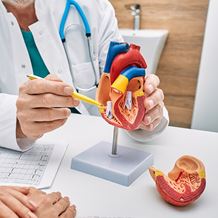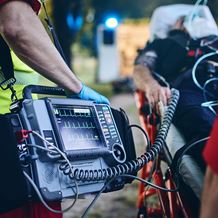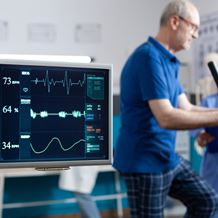Heart Failure Recovery
When your heart has stopped working properly and is unable to pump blood efficiently around your body, this is known as heart failure. Common causes of heart failure include heart valve disease, coronary artery disease, cardiomyopathy, and high blood pressure. It’s important to find out what has been causing the problem, and to prescribe the best treatment pathway to suit your needs. As the cause will be different for every patient, so will the recovery. Much of it will depend upon your age, health, and wellbeing as well as your own commitment to the recovery process. Taking an active role is crucial to achieving the best possible outcome and our specialist rehabilitation team are here to support you at every step as you regain strength and return to health. Please ask about our dedicated cardiac rehabilitation program that you can access through your hospital.
Diagnosing your heart failure
Without treatment, heart failure will only worsen so it’s important to understand the cause of the problem as soon as possible. Your doctor will talk to you about your medical history and perform a thorough physical examination. There are several tests that can help confirm heart failure:
- Electrocardiogram – information about your heart’s electrical activity
- Echocardiogram – an ultrasound image of the heart
- Chest X-ray – a picture of the chest structure, heart and lungs
- Blood tests – to pick up any hormone markers
- Stress test – to examine how well your heart works under stress
- Holter monitor – a portable device that measures your heart’s electrical activity
Your treatment and recovery program after heart failure
Although there is no definitive cure for heart failure, there are many treatment pathways that can improve your heart health and control the symptoms for many years. The exact treatment pathway will depend upon the diagnosis, and your doctor will talk to you about any individualised recommendations. The aim of the treatment plan is to treat the cause of heart failure, prevent it from worsening, improve your quality of life and help you recognise any symptoms.
Lifestyle changes
Maintaining a healthy lifestyle is a crucial aspect of making a good recovery from heart failure. Patients are typically advised to:
- Follow a healthy diet rich in fruit, vegetables, wholegrains, nuts and seeds
- Eat good fats like avocado, olive oil and fish
- Reduce salt intake
- Avoid sugary foods
- Limit alcohol and caffeine intake
- Avoid smoking
Medication
There are many medicines available to help you heart work more easily, and to help you live longer. These may include medicines to help your heart pump more slowly (beta-blockers), medicines to lower your blood pressure or diuretics to help reduce fluid build-up and swelling. Your doctor will talk to you about which medications are appropriate for your condition.
Surgery
In some cases, your doctor may recommend surgery to repair your heart, or to implant a device that will help your heart work better. This may include implantable defibrillator (ICD) surgery to regulate your heart rhythm, angioplasty and stenting to widen narrowed arteries, heart valve repair or replacement, and artery bypass surgery to help the blood move around the body by avoiding damaged arteries. Your doctor will talk to you about the best approach for your condition.
Recovering from heart failure
The key to a successful recovery is making the appropriate changes that will help the long-term health of your heart. Taking steps to protect your heart will prevent any further deterioration and reduce the risk of a cardiac event. This means tuning in to your physical symptoms and monitoring your own health. It is very common to experience anxiety and stress after heart failure. Seeking help and adopting tools and strategies that promote positivity are all helpful ways to support your general health. Your doctor may recommend that you attend a cardiac rehabilitation program to help with your general recovery. Here you will benefit from a team of trained healthcare professionals including doctors, nurses, dieticians, physiotherapists, and social workers that will all guide you through the recovery period. This dedicated team will help evaluate your personal needs, including any emotional support you may require, as well giving you the tools and strategies that aim to get you back to a healthy and active lifestyle. The guidance includes:
- Any risk factors – such as smoking, diet and anxiety or depression
- Medication requirements
- What to expect at each stage of your recovery
- How your family and friends can support your rehabilitation
- How to meet your personal recovery goals
- How to avoid the risk of another cardiac event
What to look out for at home
Heart failure symptoms can develop slowly over a long period, or more quickly in acute cases. They may include:
- Breathlessness
- Extreme fatigue
- Lightheaded and fainting
- Fluid retention and swelling
- Persistent cough
- Dizziness
Heart Failure Recovery FAQs
What's next?
If you have been experiencing heart-related symptoms, book an appointment with our cardiac services specialist today.
Our specialists in Cardiac Services
View all specialists
Related content

Cardiac Services
Cardiology services at St Vincent’s Private Hospitals, advanced cardiac care.
Read More
Heart Failure
A condition that develops when your heart is unable to pump enough blood around your body.
Read More
Recovery
Cardiac recovery and rehabilitation programs are designed to help you after surgery.
Read More


